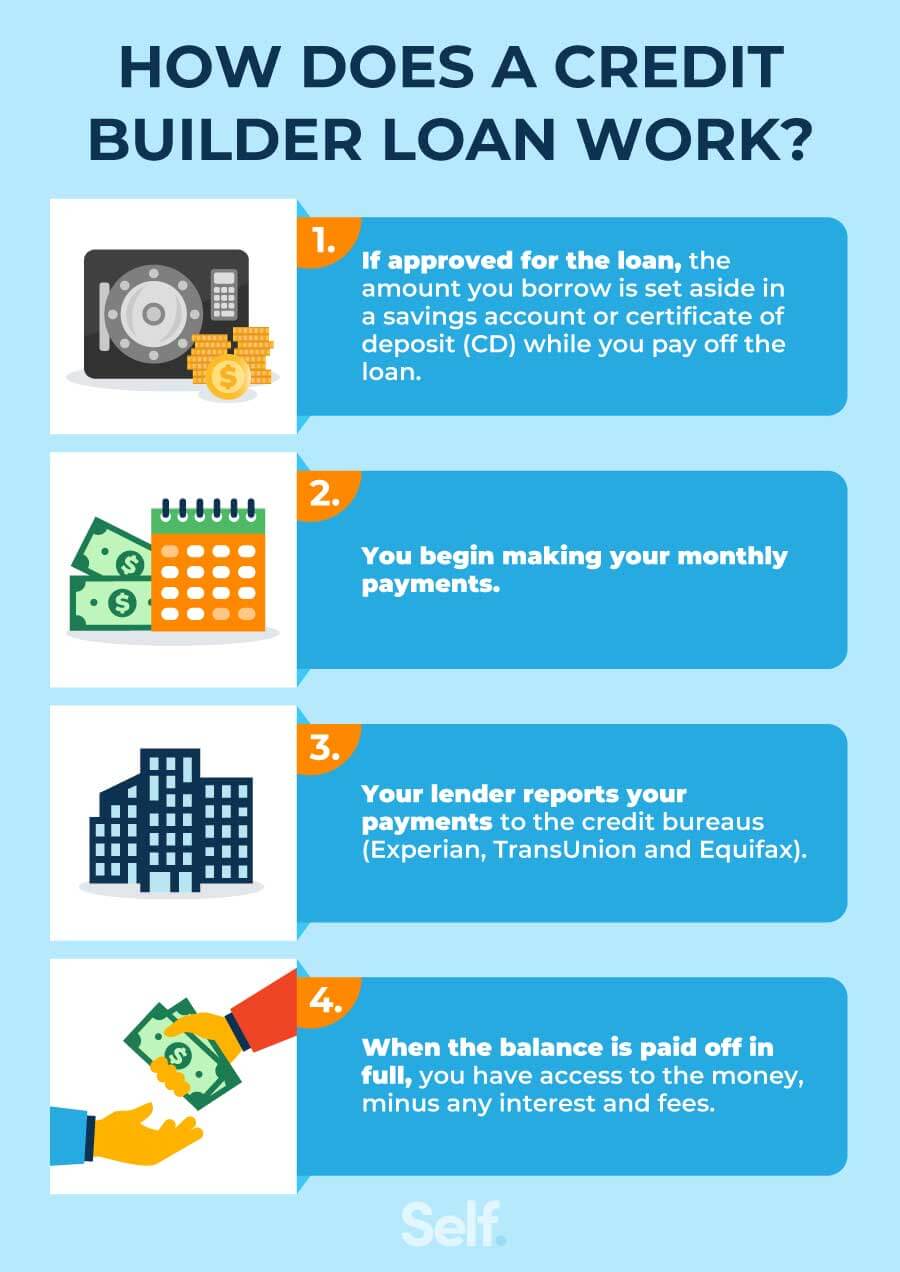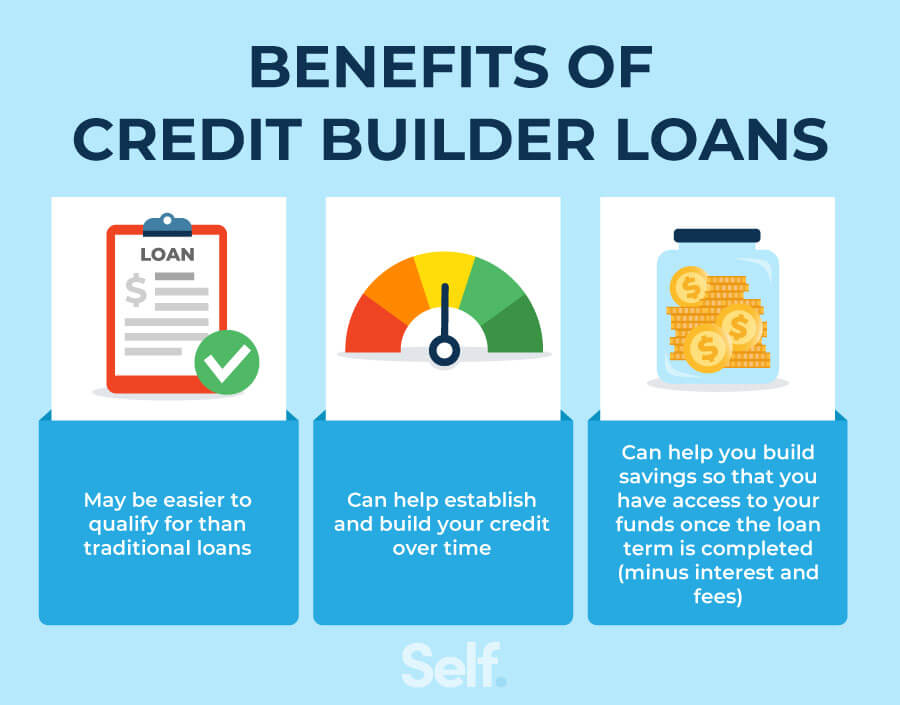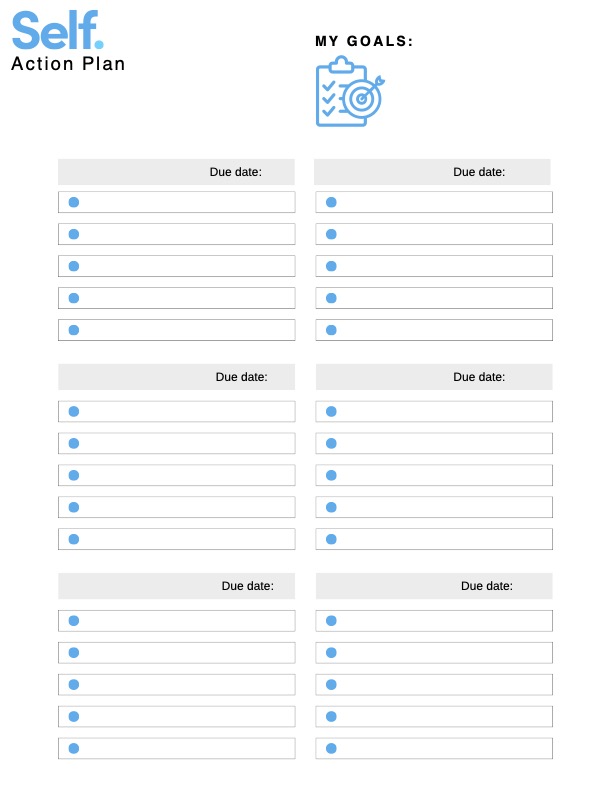What Is a Credit Builder Loan and How Does It Work?
Published on: 04/23/2025
A credit builder loan allows people with a bad credit report — or no credit history at all — to build a positive credit history. Unlike some traditional loans, a credit builder loan works like an installment loan except you don’t get your money until you finish making all the loan payments. With this type of loan, holding onto the money until you complete all the payments helps to reduce the risk to the bank. At the end of the term you receive the lump sum payment (minus interest and fees). If you are looking to build good credit, this post gives you the details on how a credit builder loan works, how to find one, and other options to help build a positive credit history.

Table of contents
- How does a credit builder loan work?
- How much does a credit builder loan cost?
- Pros and cons of credit builder loans
- How do credit builder loans help build credit?
- Can credit builder loans hurt my credit?
- Where to find a credit builder loan
- Credit builder loan alternatives
- Looking for a credit builder loan?
How does a credit builder loan work?
A credit builder loan typically has four main phases, broken down below:
- If approved for the loan, the loan amount you borrow is set aside in a secured savings account or certificate of deposit (CD) while you pay off the loan.
- You begin making your monthly payments. Typically, you can expect the loan term — the amount of time for repayment — to be 6 to 24 months.
- Your lender reports your payments to the credit bureaus (Experian, TransUnion and Equifax). Having your payments reported helps build your credit as long as you pay on time because payment history accounts for 35% of your FICO® score.[1] It is an important factor when trying to build a good credit score.
- At the end of the loan term, when the balance is paid off in full, you’ll have access to the money. You can deposit the money into your bank account and use the funds however you like. Keep in mind that any fees or interest that have been charged will be subtracted from your total final payment.Some lenders might also reimburse you for some of the interest you have already paid. [2][11]

How much does a credit builder loan cost?
The cost of a credit builder loan can vary depending on the lender. Compare loan offers by considering the differences between these three main factors that affect the total cost of your loan:
- Administrative fees: Typically, you pay these fees upfront, and they can vary. Some lenders do not charge an administrative fee.
- Interest rate or annual percentage rate (APR): The interest rate refers only to the interest charged on the loan each year, but an APR includes both the interest and other fees to express the total annual cost of your loan. So if an APR looks high compared to another lender’s rate, check to be sure whether you’re comparing APRs or interest rates. If you’re comparing an APR to an interest rate, you’re comparing two different types of rates.
Credit builder loan example
To help you understand how a credit builder loan works and the costs associated with one, we walk you through a hypothetical example that illustrates the process of applying for one:
- Say you apply for a loan of $840 at an interest rate of 14.70% and APR of 15.97%.
- You pay a one-time, nonrefundable administrative fee of $9.
- The monthly payment could be $35 per month, meaning you would need to pay that amount per month for 24 months.
- As long as you make all of your payments on time for 24 months,, you could get $724 back. — meaning the bank kept $116 in interest. In addition, you get a chance to build positive credit.
Important: Keep in mind the interest rate is different from the APR, because APR calculates the total cost of borrowing money including interest rate and fees, whereas the interest rate is just the percentage of the loan you’re charged for.[3]
Credit builder loan example - No administrative fee
Let’s take a look at another example without the $9 administrative fee, this example is based on one of Self’s Credit Builder Account plans.
- You apply for a loan of $840 with the interest rate and APR both at 15.69%.
- You pay $35 per month for 24 months.
- As long as you make your monthly payments on time over the 24 months, you can get back $717, and the final cost of the loan is $123 in interest.
Pros and cons of credit builder loans
Credit builder loans have positives and negatives so it’s a good idea to look at both sides to see if they could work for you.
Benefits of credit builder loans
- Typically easier to qualify for than conventional loans, particularly for people with poor credit or no credit history at all.
- Building your credit with on-time monthly payments through a credit builder loan can give you a better chance of approval for future credit like auto loans and mortgages.
- The money from the loan can help you build up your savings.
- Credit builder loans could help you to build your credit score as long as you make regular, on-time payments.[2]
Downsides to credit builder loans
- If you miss payments, your credit score could drop, potentially causing financial setbacks.
- May not be suitable if you need the money straight away, as you only get access to the loan funds after you’ve made all of the payments.
- Usually available in small loan amounts.
- For someone on a tight budget, the payments you make include interest and possibly fees which could impact your budget.[2]

How do credit builder loans help build credit?
A credit builder loan may be a good option for you if you need to build credit but can’t qualify for a traditional loan. Credit builder loans can help you build healthy money habits as long as you make payments on time, which can affect your payment history. However, missing a payment could make your credit worse as late payments appear on your credit report after 30 days and stay on it for seven years.[2]
These loans can have a positive impact on those who take them out and faithfully make payments. The Consumer Financial Protection Bureau (CFPB) conducted research, for which enrollment took place from September 2014 to February 2015, and released its findings in 2020. The CFPB research found that a credit builder loan increased the likelihood of establishing a credit score for participants without an existing loan by 24%. Those same participants saw their credit scores increase by 60 points more than participants with existing debt. Also, the credit builder loan resulted in an average increase in the participant’s savings balance of $253.[4]
However, for those who participated in the study and had existing debt, the credit builder loan seemed to have a negative impact on their credit scores. Those with existing loans had their scores impacted by a slight decrease, indicating that they may have experienced difficulty making credit builder loan payments on top of their current obligations.[4]
Can credit builder loans hurt my credit?
Credit builder loans can hurt your credit score if you miss payments or make payments more than 30 days late.. To help prevent damaging your credit, set a realistic monthly budget to ensure that you can make on-time payments and give yourself a better chance at building a positive credit history.[5]
Where to find a credit builder loan
If you’re looking for a credit builder loan, there are a few places where you can find one. Take a look at some of the options below.
- Online lenders: You can get credit builder loans from online lenders, which is often the easiest way to do it. One option to consider is the Self credit builder account if you are looking for an online lender.
- Credit unions: Credit unions may also offer credit builder loans, you may need to become a member to apply. The advantage is that they often have lower interest rates than banks.
- Community banks: A community bank in your local area might offer credit builder loan options.[6]

Credit builder loan alternatives
If you’re not convinced that a credit builder loan makes sense for you, consider some of these alternatives which can also help you build credit.
Consider using a secured credit card
A secured credit card gives you access to a line of credit upfront in exchange for a security deposit usually in the form of a savings account or certificate of deposit that’s used as collateral. This deposit usually sets your credit limit. You still have to make monthly payments on purchases you make — the deposit doesn’t cover your monthly payment — so make sure you use this option responsibly to build your credit, or you risk causing more damage to your credit history.[7]
Become an authorized user
Another alternative to a credit builder loan, you can become an authorized user if you know someone who would be willing to add you to their credit card account. Becoming an authorized user can help build or restore credit, as long as you and any other user continue to make on-time payments, the credit utilization ratio (CUR; the total balance of the card divided by the total credit limit) remains low and the account has been open for a while. Of course, you risk damaging your own and the other person’s credit if the converse is true: Your friend or family member makes late payments or none at all, the CUR is high or the account has been just recently opened.[8]
Consider taking out a personal loan
A personal loan can also allow you to develop a positive payment history and have a mix of credit options on your report. Your credit mix accounts for 10% of your FICO® score, so if you add a new type of credit product to your history, you may see an impact on your score if you make on-time payments. If you handle a variety of credit products well, you show lenders that you may be a lower risk to lend to. Of course, because payment history accounts for 35% of your score, making on-time payments, or the lack thereof, can have the most impact on your score.[1]
Although personal loans may sound like the perfect alternative, keep in mind that personal loans can have their downsides as well. Personal loans tend to charge a high APR (annual percentage rate). Interest rates for personal loans may be fixed or variable interest rates, and those with lower credit scores may be charged a higher interest rate.[9]
A fixed-rate doesn’t change over the loan term, but a variable rate can change based on whatever index your lender uses to calculate rates. So what may look like an affordable rate can fluctuate over your loan term. So carefully consider the loan terms and how a variable rate could impact your monthly budget before taking on a loan with a variable rate that could go up and make your payments higher.[10]
Looking for a credit builder loan?
If you think a credit builder loan may work for you, just remember the basic differences from traditional installment loans where you get a lump sum upfront and make monthly payments to pay the loan off. With credit builder loans, you make monthly payments to the lender who puts the money into a certificate of deposit (CD) or a savings account. Once you’re done making all the payments, the lender returns that money to you (minus interest and fees). By making on-time payments, you can elevate your credit score while you also build your savings.
Once your Credit Builder Account* is completed, it is the perfect opportunity to further address your future financial goals. Think back to the initial goals you set when you began building credit. What is your “why”? To purchase a car? Or maybe buy a home in the future? Get started by writing down your financial goals on this template.

*Credit Builder Accounts & Certificates of Deposit made/held by Lead Bank, Sunrise Banks, N.A., First Century Bank, N.A., each Member FDIC. Subject to credit approval. Results not guaranteed.
Sources
- myFICO. “What's in my FICO® Scores?” https://www.myfico.com/credit-education/whats-in-your-credit-score.
- Equifax. "What Is a Credit-Builder Loan?" https://www.equifax.com/personal/education/credit-cards/articles/-/learn/credit-builder-loan/.
- Experian. “Personal Loan Interest Rates and APRs: What’s the Difference?”
- “https://www.experian.com/blogs/ask-experian/what-is-the-difference-between-apr-and-interest-rate-on-a-personal-loan/.
- Consumer Financial Protection Bureau. "CFPB Study Shows Financial Product Could Help Consumers Build Credit," https://www.consumerfinance.gov/about-us/newsroom/cfpb-study-shows-financial-product-could-help-consumers-build-credit.
- Experian, “Credit Builder Loans Vs Secured Credit Cards” https://www.experian.com/blogs/ask-experian/should-i-get-a-credit-builder-loan-or-a-secured-credit-card/.
- Experian. "How Do I Get a Credit-Builder Loan?" https://www.experian.com/blogs/ask-experian/how-do-I-get-a-credit-builder-loan.
- Equifax, “What is a Secured Credit Card?” https://www.equifax.com/personal/education/credit-cards/articles/-/learn/what-is-a-secured-credit-card-do-they-build-credit/ Accessed March 24 2025
- Experian. "Will Being an Authorized User Help My Credit?" https://www.experian.com/blogs/ask-experian/will-being-an-authorized-user-help-my-credit.
- NerdWallet, “Personal Loans” https://www.nerdwallet.com/personal-loans.
- Experian. “Fixed APR vs. Variable APR: What’s the Difference?” https://www.experian.com/blogs/ask-experian/fixed-apr-vs-variable-apr/#:~:text=Quick%20Answer,consumer%20credit%20and%20finance%20education.
- Bankrate, “Pros and Cons of Credit Builder Loans” https://www.bankrate.com/loans/personal-loans/pros-and-cons-of-credit-builder-loans/.
About the author
Ana Gonzalez-Ribeiro, MBA, AFC® is an Accredited Financial Counselor® and a Bilingual Personal Finance Writer and Educator dedicated to helping populations that need financial literacy and counseling. Her informative articles have been published in various news outlets and websites including Huffington Post, Fidelity, Fox Business News, MSN and Yahoo Finance. She also founded the personal financial and motivational site www.AcetheJourney.com and translated into Spanish the book, Financial Advice for Blue Collar America by Kathryn B. Hauer, CFP. Ana teaches Spanish or English personal finance courses on behalf of the W!SE (Working In Support of Education) program has taught workshops for nonprofits in NYC.
Editorial policy
Our goal at Self is to provide readers with current and unbiased information on credit, financial health, and related topics. This content is based on research and other related articles from trusted sources. All content at Self is written by experienced contributors in the finance industry and reviewed by an accredited person(s).
